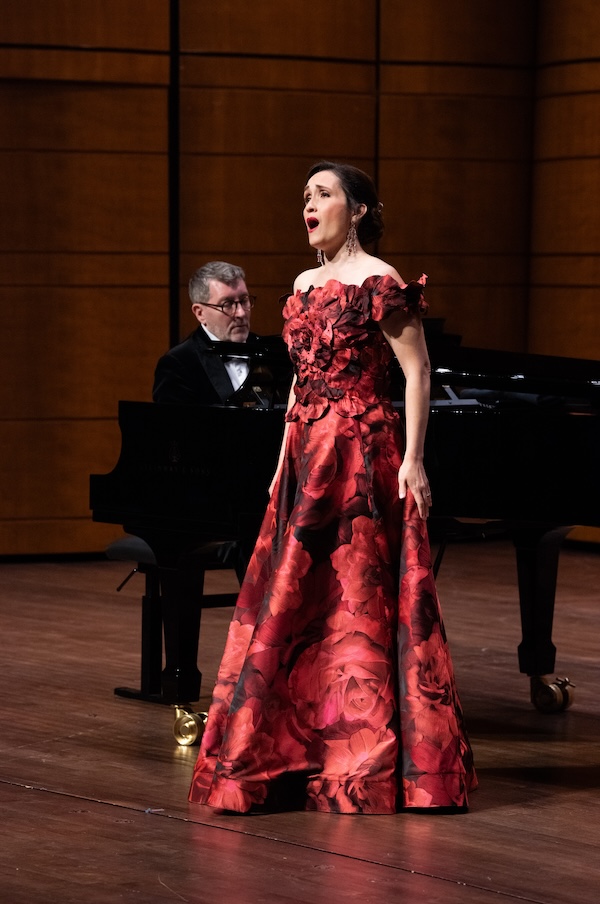Morley scales the heights in impressive finale to Vocal Arts season

Erin Morley performed a recital with pianist Gerald Martin Moore Monday night at the Kennedy Center presented by Vocal Arts DC. Photo: Courtney Ruckman/VADC
Erin Morley made quite an impression in her debut with Washington Concert Opera two years ago, as the title character in Delibes’s Lakmé, where she displayed her mastery of the upper echelons of the coloratura range. Her Vocal Arts DC recital with pianist Gerald Martin Moore, heard Monday night in the Kennedy Center Terrace Theater, proved equally accomplished. (Morley dedicated the recital to her mother, Elizabeth Palmer, concertmaster of the Salt Lake Symphony Orchestra in Utah, where the singer grew up.)
Most of the evening’s program came from the duo’s new flower-themed album, released last month. Morley opened with the world premiere of a new song cycle by Ricky Ian Gordon, Huit Chansons de Fleurs. The piece, commissioned by major donors to the Metropolitan Opera, brings together eight floral poems, with suitably perfumed music by Gordon.
A wandering melody in Moore’s right hand introduced the first song, an enigmatic flourish that would return in the eighth and final song. Gordon’s saccharine harmonic style, rife with jazz-influenced extended triadic chords, made several songs sound too similar. The recycling of melodic motifs in the first two songs, on poems by Emily Dickinson and William Wordsworth, reinforced this sense of sameness.
Morley sang the cycle with exceptional dignity, her precise English diction revealing the poetry in its best light, generally set to advantage by Gordon’s voice-centered approach. Other than some shimmering high notes, Gordon avoided coloratura decoration. Morley instead delivered a poignantly beautiful legato tone, lyrical and refreshing.
Some more caustic poems cut through the treacle of the opening, including the pairing of a poem by Jane Kenyon about her garden, paired tragically with a poem by her husband about letting weeds take over the garden after her death from leukemia. Musically this proved the centerpiece of the cycle as well, with a stark single line introducing “Peonies at Dusk” in the piano, followed by a sobbing vocalise for Morley at the end. Dorothy Parker’s snarky “One Perfect Rose” added a welcome anti-sentimental note, as did Gordon’s own poem “The Tulips,” about a dying love.
Morley floated her vocal lines with engaging lightness in Bizet’s “Ouvre ton coeur” and Debussy’s “Les Papillons.” The latter featured fine accompaniment from Moore, whirling through streams of figuration at the piano. The first coloratura displays came with “La Libellule,” which Camille Saint-Saëns wrote for American soprano Sibyl Sanderson. Morley negotiated several excursions above high C with elegant placement and intonation.
The second half brought most of the evening’s delights, starting with the avian vocalise of “Le rossignol et la rose,” from the incidental music Saint-Saëns composed for the play Parysatis. With no text and only sparse chords in the piano, Morley spun out a gorgeously fluid sound, up to extraordinary high notes, again above high C, and some cleanly delineated chromatic scales pouring downward.
A remarkable series of Russian and German songs followed, centered more on lyrical beauty than soprano pyrotechnics. More melancholy associations of flowers came through in textured renditions of Rachmaninoff’s “Lilacs” and Rimsky-Korsakov’s “The Rose Enslaves the Nightingale,” with its exotic augmented seconds redolent of Arabian folk music.
Most impressive of this set was Alexander Zemlinsky’s “Vöglein Schwermut,” about a bird that spreads its death-tinged melancholy about the world. Hypnotically rendered by both musicians, the song featured delicate high notes at the words “Flieg, mein Vögelchen!” (Fly, my little bird). The bird in Alban Berg’s “Die Nachtigall,” an equally mysterious song, causes roses to spring up where its songs resound, ending with more impressive high notes.
The last set of songs was “the dessert portion” of the program, as Moore put it during his entertaining spoken remarks, touching on the many eccentricities of sopranos of the past. Julius Benedict’s “La Capinera” offered many more high Cs, among many notes set with utmost clarity even in staccato articulation. The arrangement of “Last Rose of Summer,” a favorite of Jenny Lind, was transposed up to feature more stunning top notes.
Even higher was the stratospheric F sharp in “Neath My Lattice,” from The Rose of Persia by Arthur Sullivan, whose birthday happened to fall that day. Moore, clearly an archeologist of historic vocal exploits, resurrected the cadenza Sullivan wrote for soprano Ellen Beach Yaw, known as the “California Nightingale,” for Morley to sing. Sadly, it was not paired with flute as in the recording, but Moore nicely matched his singer.
Morley’s single encore was “We’ll Gather Lilacs” from Ivor Novello’s Perchance to Dream, a musical premiered in London. The final track from her recent recording, it made a sentimental conclusion to the evening, capped with a little coda and a limpid last high note from the singer we might now call the “Utah Nightingale.”
Vocal Arts DC announced its 2024-2025 season last month, with the recital debut of tenor Lunga Eric Hallam on November 19 among the highlights. vocalartsdc.org
